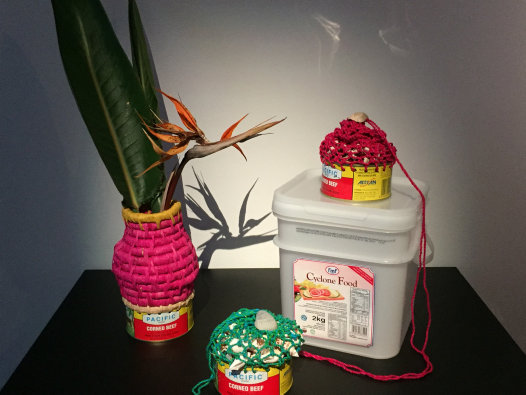One of the poignant stories was Yasbelle Kerkow’s account about cyclone food and her art installation highlighting such food in Fiji.
The Oceania Rising program (2018) was concluded on 10 November at the Casula Powerhouse Arts Centre with a colourful Talanoa Pacifica Festival Ao (day) Po (night) featuring entertainment, food and a variety of arts, including the exhibition Wayfinders with video, installations, 3-dimensional and new-media forms. This was preceded by the reading of From Malapo to Miller a play by a Tongan-Australian writer Winnie Siulolovao Dunn and by the forum on climate change and the future of contemporary arts in Oceania.
The forum, one of several comparable events staged through the Oceania Rising program, brought us numerous stories, ideas, comments and some very personal recollections about climate change sweeping through the Pacific island nations and how people suffer, struggle, and respond to this momentous challenge in human history.
Moderated by the ABC presenter Seini F Taumoepeau, the forum panel included the 350 org activist Joseph-Zane Sikulu, writer Winnie Siulolovao Dunn and artists Donita Hulme and Yasbelle Kerkow. We got a sense that the Pacific Islanders are one of humanity’s front lines to wrestle with the impact of climate change and for the variety of historical reasons, not best resourced to do so. But they show enormous resilience and fortitude to wrestle with the problem, alert other nations and pioneer some sustainable solutions.
We heard from Joseph-Zane Sikulu about increased frequency and severity of cyclones, which not long ago were experienced once in a decade, and now continue coming in quick successions – before the community and their food crops can recover the new cyclone is approaching. We heard from Winnie Siulolovao Dunn how climate change is largely caused by collective human exploitation of resources and how they are divided unevenly between rich nations and those who are kept poorer, to a high degree by colonial (and post-colonial) “world order” as well as the relentless juggernaut of capitalism itself. We heard how Pacific women writers are finding their voice and space to conceive and convey the stories from their perspective to talk about climate change; to shift the global narrative and mobilise nations to effective action. We heard from Donita Hulme a very personal account of devastating results of changing climate and how it’s transformed into art. We heard from Yasbelle Kerkow about the importance of local collective networking and activism and how communities respond to relentless disasters.
One of the poignant stories was Yasbelle Kerkow’s account about cyclone food and her art installation highlighting such food in Fiji. After severe cyclone when garden and food crops are destroyed, people revert to highly processed and unhealthy conserved and packaged food, known colloquially as cyclone food. I talked with Yasbelle about it because I found it tragically paradoxical that processed food – produced specifically and exclusively for profit and one of the major causes of environmental degradation caused by industrialised economies, would come as a food in a time of disaster. We reflected on and wanted to know why capitalism is allowed to wreck countless human lives (and the planet) and how the traditional practices of food provision in the Pacific Island nations could serve as a model for sustainable food production in the industrial countries.
We did not solve the world problems, yet! But the innumerable encounters like this, a forum of concerns and ideas, turns us into a collective that demands answers and call to account leaders of all shapes and stripes. And this is what Oceania Rising invited us to do via a series of art exhibitions, workshops, community-directed discussions, challenging talks and film screening. We are becoming better informed, more alert and significantly more united in our stand on necessary action to curb the magnitude of climate change and meaningfully mitigate the devastation it causes.
Image: Cyclone Food 2018: by Yasbelle Kerkow
Photographer: Stan Florek © Stan Florek


 Copy Protected by Chetan's WP-Copyprotect.
Copy Protected by Chetan's WP-Copyprotect.